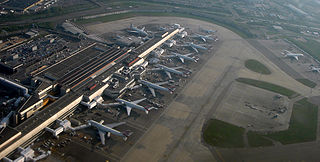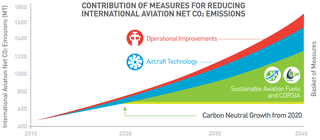Related Research Articles
Carbon neutrality refers to achieving net-zero carbon dioxide emissions. This can be done by balancing emissions of carbon dioxide with its removal or by eliminating emissions from society. It is used in the context of carbon dioxide-releasing processes associated with transportation, energy production, agriculture, and industry.
Heathrow Airport Holdings is the United Kingdom-based operator of Heathrow Airport. The company also operated Gatwick Airport, Stansted Airport, Edinburgh Airport and several other UK airports, but was forced by the Competition Commission to sell them in order to break up a monopoly. It was formed by the privatisation of the British Airports Authority as BAA plc as part of Margaret Thatcher's moves to privatise government-owned assets, and was once a constituent of the FTSE 100 Index.
A carbon credit is a generic term for any tradable certificate or permit representing the right to emit one tonne of carbon dioxide or the equivalent amount of a different greenhouse gas (tCO2e).

The European Union Emissions Trading System (EU ETS), was the first large greenhouse gas emissions trading scheme in the world, and remains the biggest. It was launched in 2005 to fight global warming and is a major pillar of EU energy policy. As of 2013, the EU ETS covers more than 11,000 factories, power stations, and other installations with a net heat excess of 20 MW in 31 countries—all 27 EU member states plus Iceland, Norway, Liechtenstein and United Kingdom. In 2008, the installations regulated by the EU ETS were collectively responsible for close to half of the EU's anthropogenic emissions of CO2 and 40% of its total greenhouse gas emissions. By 2020 the EU hopes to cut greenhouse gas emissions by 20% compared with 1990 and to increase energy efficiency by 20%. A 2020 study estimated that the EU ETS had reduced CO2 emissions by more than 1 billion tons between 2008 and 2016 or 3.8% of total EU-wide emissions.
Business action on climate change includes a range of activities relating to global warming, and to influencing political decisions on global-warming-related regulation, such as the Kyoto Protocol. Major multinationals have played and to some extent continue to play a significant role in the politics of global warming, especially in the United States, through lobbying of government and funding of global warming deniers. Business also plays a key role in the mitigation of global warming, through decisions to invest in researching and implementing new energy technologies and energy efficiency measures.
The Aviation Environment Federation (AEF) is the principal UK non-profit making organisation concerned with the environmental effects of aviation. These range from aviation noise issues associated with small airstrips or helipads to the contribution of airline emissions to global warming and climate change. The AEF is widely quoted in international media as a source of research and analysis on issues related to aviation and the environment.
Various energy conservation measures are taken in the United Kingdom.

Like other emissions resulting from fossil fuel combustion, aircraft engines produce gases, noise, and particulates, raising environmental concerns over their global impact and their local air quality effect. Jet airliners contribute to climate change by emitting carbon dioxide, the best understood greenhouse gas, and, with less scientific understanding, nitrogen oxides, contrails and particulates. Their radiative forcing is estimated at 1.3–1.4 that of CO
2 alone, excluding induced cirrus cloud with a very low level of scientific understanding. In 2018, global commercial operations generated 2.4% of all CO
2 emissions.
Silverjet was a British all-business class airline headquartered at London Luton Airport in Luton, Bedfordshire, England, that, prior to the suspension of operations on 30 May 2008, operated services to Newark Liberty International Airport and Dubai International Airport. A proposed rescue package fell through on 13 June when staff were laid off and it was announced that the airline's assets would be sold.

Air transport in the United Kingdom is the commercial carriage of passengers, freight and mail by aircraft, both within the United Kingdom (UK) and between the UK and the rest of the world. In the past 25 years the industry has seen continuous growth, and the demand for passenger air travel in particular is forecast to increase from the current level of 236 million passengers to 465 million in 2030. One airport, Heathrow Airport, is amongst the top ten busiest airports in the world. More than half of all passengers travelling by air in the UK currently travel via the six London area airports. Outside London, Manchester Airport is by far the largest and busiest of the remaining airports, acting as a hub for the 20 million or so people who live within a two-hour drive. Regional airports have experienced the most growth in recent years, due to the success of low-cost carrier airlines over the last decade.

The environmental impact of aviation in the United Kingdom is increasing due to the increasing demand for air travel in the country. In the past 25 years the UK air transport industry has seen sustained growth, and the demand for passenger air travel in particular is forecast to increase more than twofold, to 465 million passengers, by 2030. Two airports; London Heathrow and London Gatwick, are amongst the top ten busiest airports in the world for international passenger traffic. Whilst more than half of all passengers travelling by air in the UK currently travel via the five London area airports, regional airports have experienced the most growth in recent years, due to the success of 'no-frills' airlines over the last decade.
Flying Matters was a pro-aviation coalition in the United Kingdom. Members included tourist organisations, airlines, aerospace manufacturers, trade associations, airport operators, growers and others. Formed in June 2007, they have issued briefings, press releases, lobbied Members of Parliament and commissioned advertisements. The organisation was wound up at the end of April 2011 following the withdrawal of four founding members including BA, BAA and Virgin Atlantic.

Plane Stupid is a UK-focused group of environmental protesters who state their aim as wanting to see an end to airport expansion for what it sees as "unnecessary and unsustainable" flights. It is a loose association of autonomous regional groups, and is funded by donations.
The expansion of Heathrow Airport is a series of proposals to add to the runways at London's busiest airport beyond its two long runways which are, since the 1990s, intensively used to serve four terminals and a large cargo operation. The plans are those presented by Heathrow Airport Holdings and an independent proposal by Heathrow Hub with the main object of increasing capacity.

Airport Carbon Accreditation is a global carbon management programme for airports that independently assesses and recognises airports' efforts to manage and reduce their CO2 emissions. Aircraft emissions, which are many times greater than airport emissions, are not included in the programme. The airport industry accounts for 5% of the air transport sector’s total carbon emissions.
Manchester Metropolitan University's Centre for Aviation, Transport and the Environment (CATE) is an international research centre based at the Dalton Research Institute specialising in the environmental impacts of the aviation industry.
The Airports Commission was an independent commission established in September 2012 by the Government of the United Kingdom to consider how the UK can "maintain its status as an international hub for aviation and immediate actions to improve the use of existing runway capacity in the next 5 years". Alongside the proposal to build HS2, the question of how to make best use of and expand airport capacity has become the UK's most significant infrastructure issue over the last few years.

The Carbon Offsetting and Reduction Scheme for International Aviation (CORSIA) is a carbon offset and carbon reduction scheme to lower CO2 emissions for international flights, to curb the aviation impact on climate change.

Alice Larkin is Head of the School of Engineering at the University of Manchester and a Professor of Climate Science and Energy Policy. She works on carbon budgets and cumulative emissions. She leads the Engineering and Physical Sciences Research Council (EPSRC) consortium project Stepping Up Nexus.

Stay Grounded is a global network of more than 160 member organisations promoting alternatives to aviation to address climate change. Founded in 2016, their work is rooted in fostering sustainable transport and campaigning against controversial climate strategies. The network consists of local airport opposition groups, climate justice activists, NGOs, trade unions and academics, among others.
References
- ↑ "AirportWatch website". AirportWatch. Archived from the original on 13 January 2008. Retrieved 27 December 2007.
- ↑ Vidal, John (27 July 2007). "Catch-all Heathrow protest injunction could bar millions". The Guardian . London. Retrieved 27 December 2007.
- ↑ "Heathrow airport's operator wins injunction to stop protesters". International Herald Tribune . 6 August 2007. Retrieved 27 December 2007.
- ↑ "Boom in Scots air travel set to bust emissions targets". Sunday Herald . 8 April 2009. Archived from the original on 9 February 2009. Retrieved 12 May 2009.
- ↑ "Issues in a nutshell". AirportWatch. Archived from the original on 10 January 2008. Retrieved 27 December 2007.
- ↑ "Research shows aviation growth will wreck climate targets". Friends of the Earth . Retrieved 27 December 2007.